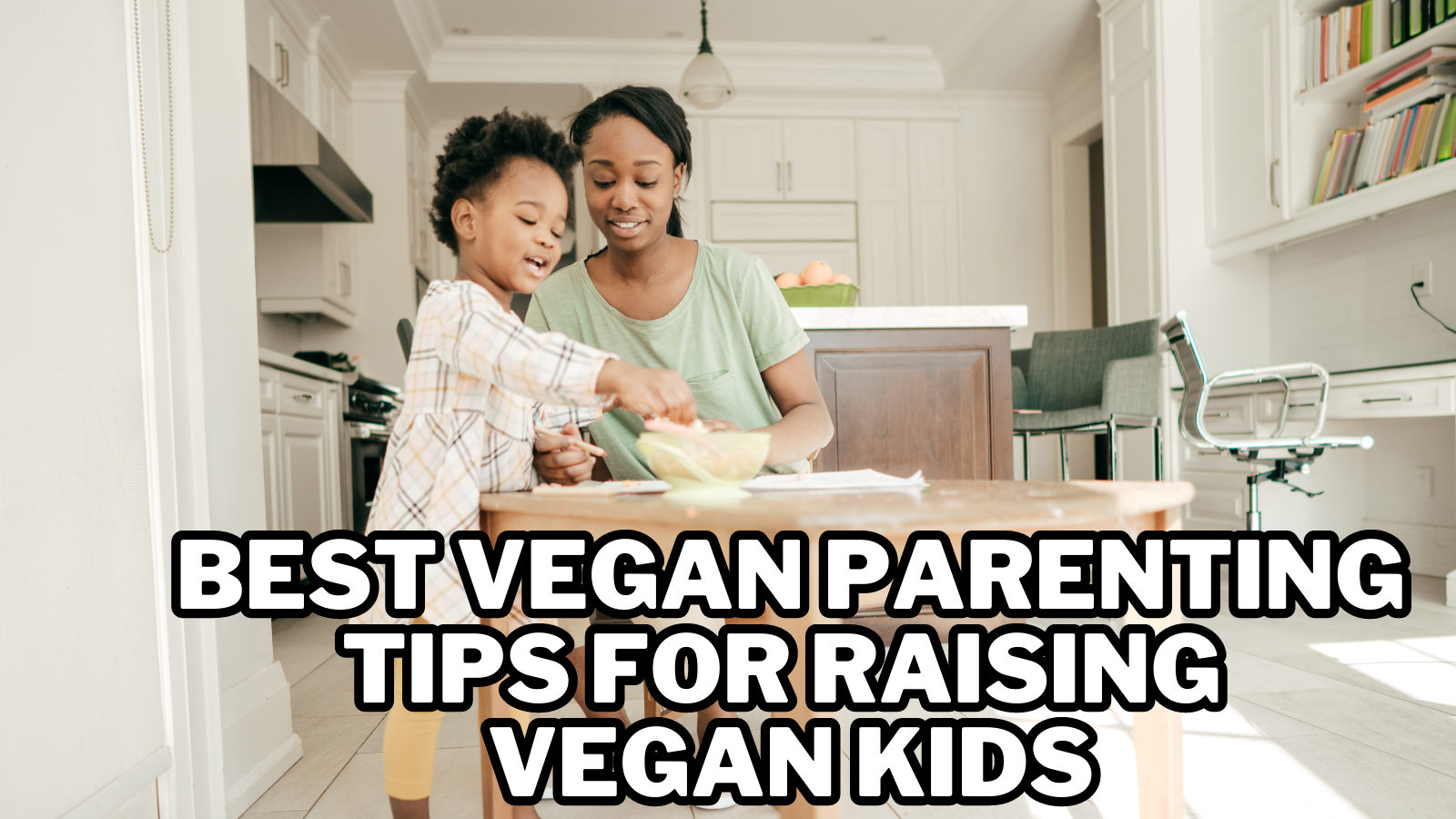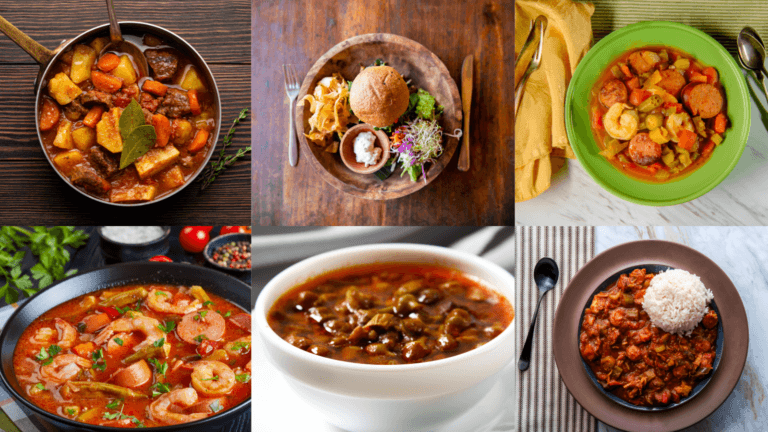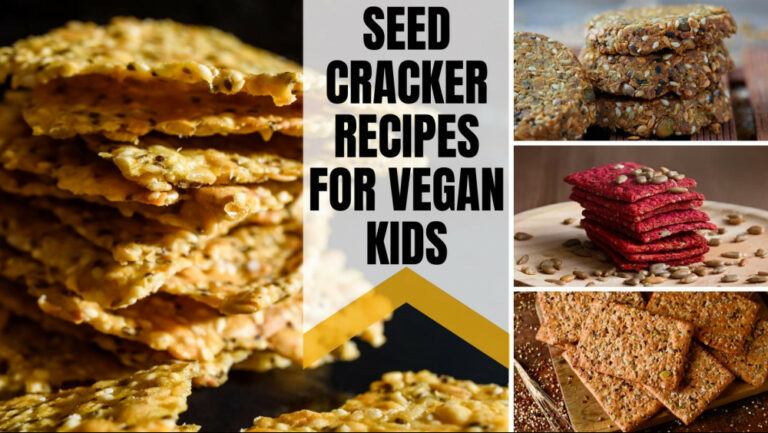Best Vegan Parenting Tips For Raising Vegan Kids
Best Vegan Parenting Tips For Raising Vegan Kids
Raising vegan kids in today’s world can be both rewarding and challenging. As a parent, you're not only nurturing their health but also instilling compassion, sustainability, and mindful eating habits from an early age.
With the proper guidance, support, and creativity, vegan parenting can be a joyful journey. In this blog, we’ll share the best vegan parenting tips to help your children thrive on a plant-based lifestyle.
1. Consult With A Pediatrician Or Registered Dietitian
Consulting with a pediatrician or registered dietitian can help parents ensure their child meets their daily caloric needs.
Children have smaller stomachs and require more calories per kilogram of body weight than adults, so it's essential to ensure they get enough food to support their growth and development.
A healthcare professional can also help monitor your child's growth and development to ensure they meet their milestones.
In addition to providing advice on nutrition, a pediatrician or registered dietitian can also offer guidance on how to talk to your child about veganism and answer any questions or concerns.
This can be especially important as your child ages and interacts more with peers with different dietary habits.
Overall, consulting with a healthcare professional can help to ensure that your child gets all the necessary nutrients for their growth and development while following a vegan diet. It can also provide peace of mind for parents concerned about their child's nutrition.
2. Focus On A Variety Of Whole Foods
When raising a vegan child, it is essential to provide them with various whole foods to ensure they receive all the necessary nutrients for their growth and development.
Fruits, vegetables, whole grains, legumes, nuts, and seeds are all excellent sources of nutrients and should be included in your child's diet.
To make mealtime more enjoyable, encourage your child to try new foods and flavours by introducing them to different cuisines and cooking methods.
For example, you can make a stir-fry with various colourful vegetables or a veggie-packed pizza with a homemade crust.
You can also involve your child in meal planning and preparation, allowing them to choose and prepare their own meals with your guidance.
This will make mealtime more fun and help your child develop healthy eating habits that they can carry into adulthood.
3. Include Sources Of Protein
Protein is an essential nutrient for building and repairing tissues in the body. Protein sources include tofu, tempeh, lentils, chickpeas, and quinoa. These foods can be incorporated into various meals, such as stir-fries, soups, and salads.
Nuts, seeds, and nut butter are good protein sources and can make great snacks. For example, give your child a handful of almonds or sunflower seeds or spread peanut butter on apple slices for a delicious and nutritious snack.
Including protein-rich foods in your child's diet can help to support their growth and development.
4. Provide Sources Of Iron And Zinc
Iron and zinc are two essential minerals for children's growth and development. While meat is commonly believed to be the only good source of these nutrients, plenty of vegan sources are available.
Good vegan sources of iron include leafy green vegetables such as spinach and kale, lentils, beans, and fortified cereals.
For example, a cup of cooked lentils contains about 6.6 mg of iron, about 37% of the recommended daily intake for children.
Good vegan sources of zinc include nuts, seeds, and whole grains. For example, a ¼ cup of pumpkin seeds contains about 2.3 mg of zinc, about 21% of the recommended daily intake for children.
It is important to note that iron and zinc absorption can be enhanced by consuming them with vitamin C-rich foods, such as citrus fruits or bell peppers. Ensuring your child gets adequate minerals can help support their growth and development.
5. Supplement With Vitamin B12
Vitamin B12 is crucial for maintaining nerve function and producing red blood cells. It is primarily found in animal products like meat, fish, and dairy.
As a vegan parent, ensuring your child gets enough vitamin B12 from their diet or supplements is essential.
Foods fortified with vitamin B12, such as plant-based milk, breakfast cereals, and nutritional yeast, can be a good source of this nutrient for vegans. However, it may be difficult for children to consume enough of these fortified foods to meet their daily vitamin B12 needs.
Therefore, a vegan vitamin B12 supplement may be necessary. It's important to consult with a pediatrician or registered dietitian to determine your child's appropriate dose and type of vitamin B12 supplement.
Additionally, it's important to note that some plant-based milk and other products may contain vitamin B12 analogs, which can interfere with vitamin B12 absorption and lead to a deficiency.
Therefore, it's essential to choose products that contain only vitamin B12 or the form of vitamin B12 that is well-absorbed by the body.
6. Be Mindful Of Calcium And Vitamin D
Calcium and Vitamin D are essential for developing and maintaining strong bones and teeth.
Leafy green vegetables such as kale, collard greens, and bok choy are excellent sources of calcium. Fortified plant-based milk, such as soy, almond, and oats, can also provide calcium.
Tempeh and some varieties of beans are also good sources of calcium. Vitamin D is mainly obtained through exposure to sunlight, but it can also be found in fortified plant-based milk, orange juice, and some cereals.
Be mindful of these nutrients and ensure your child gets enough through their diet or supplements.
7. Lead By Example
As a parent, leading by example is one of the most effective ways to instill healthy habits in your child.
This is particularly important regarding a vegan diet, as it can be challenging for some children to understand why they can't eat certain foods that their friends or classmates may enjoy.
Encourage your child to try different foods and flavours by involving them in the planning and preparing meals.
Take them to the grocery store and show them how to read food labels and identify healthy options. When dining out, research vegan-friendly restaurants in your area and make it a fun family outing.
By demonstrating your commitment to a vegan lifestyle and making it an enjoyable experience for your child, you can help them develop a positive relationship with food and a lifelong commitment to healthy habits.
8. Educate Your Child
Educating your child about veganism can help them understand the importance of plant-based eating and why your family chose this lifestyle.
You can start by explaining the health benefits of a vegan diet and how it can help prevent chronic diseases such as heart disease and diabetes.
You can also talk about the environmental benefits of veganism, such as reducing your carbon footprint and minimizing animal suffering.
You can also provide age-appropriate resources, such as books and documentaries, that explain veganism and its benefits.
Educating your child can help them make informed choices about their diet and develop a positive relationship with food.
9. Be Patient And Flexible
Transitioning to a vegan lifestyle can be challenging for parents and children. It is essential to be patient and relaxed during this process.
Children may need time to adjust to new foods and may resist change. It's necessary to allow them to make their own choices and to respect their preferences while providing them with nutritious vegan options.
Sometimes, parents may need to adjust their meal plans to ensure their children receive all the necessary nutrients.
It's important to remember that transitioning to a vegan lifestyle is a journey, and there may be ups and downs. Celebrate the small victories and milestones, and be open to making changes as needed.
For example, if your child is not getting enough protein, you may need to incorporate more protein-rich plant-based foods such as beans, tofu, or quinoa.
Parents can raise happy and healthy vegan children with patience, flexibility, and an open mind.
10. Address Social Challenges
Going vegan can sometimes present social challenges, especially for children. It's important to prepare your child and help them feel confident in their food choices.
One way to address these challenges is to bring vegan-friendly snacks or dishes to social events or restaurants.
You can also research vegan-friendly restaurants and familiarize your child with their menus. It's also essential to educate your child on communicating their dietary needs to others, such as politely informing servers or hosts of their vegan lifestyle.
Encourage your child to be proud of their choices and to see it as an opportunity to educate others about veganism.
By addressing social challenges positively and proactively, your child can feel empowered and confident in their vegan lifestyle.
11. Focus On The Positive
Focusing on the positive aspects of a vegan lifestyle can help your child develop a positive relationship with plant-based eating.
Highlight the delicious and nutritious plant-based foods available, and involve your child in meal planning and preparation.
You can also celebrate the environmental benefits of a vegan lifestyle by teaching your child about the impact of animal agriculture on the planet and the importance of sustainable living.
Additionally, discussing the ethical considerations of choosing a vegan lifestyle can help your child develop a sense of compassion and empathy towards animals.
By emphasizing the positive aspects of a vegan lifestyle, you can create a positive and sustainable approach to plant-based eating that your child will carry with them throughout their life.
For example, you can celebrate vegan holidays like World Vegan Day, create fun and tasty vegan meals together as a family, and share stories about the positive impact of a vegan lifestyle on your health and well-being.
12. Encourage Your Child To Try Various Foods
Encouraging your child to try multiple plant-based foods can help them develop a taste for diverse flavours and expand their palate.
Start by introducing new fruits and vegetables to their diet and involve them in meal planning and preparation.
For example, you can have them pick out a fresh fruit or vegetable at the grocery store and experiment with different ways to prepare it at home.
You can also make mealtime fun by playing games or having theme nights, such as “taco night” or “pizza night,” where your child can choose their toppings and get creative with their food choices.
Additionally, try not to force your child to eat certain foods, as this can create negative associations with those foods.
Instead, continue to offer various options and let your child explore and experiment with their food choices at their own pace.
13. Teach Your Child About The Ethical And Environmental Benefits Of A Vegan Lifestyle
Teaching children about the ethical and environmental benefits of a vegan lifestyle can help them become more conscious and mindful of their food choices.
For example, you can explain how choosing not to consume animal products can help to reduce animal suffering and promote a more sustainable and compassionate world.
You can also discuss how the meat and dairy industry contributes to greenhouse gas emissions and environmental degradation.
By educating your child about these issues, they can develop a sense of social responsibility and a deeper appreciation for the impact of their food choices.
Encourage them to ask questions and provide resources such as books, documentaries, and websites that can help them learn more about the benefits of a vegan lifestyle.
14. Connect With Other Vegan Families
Connecting with other vegan families can be a great way to find support and share tips and advice.
You can search for vegan parenting groups on social media platforms like Facebook or Instagram or find local meetups through websites like Meetup.com.
Joining these groups can allow you to connect with other families who share your values and experiences.
You can exchange recipes and meal-planning ideas, discuss challenges and solutions, and organize playdates and outings with other vegan families.
It can be a great way for your child to meet other vegan children and make new friends with similar lifestyles.
Additionally, you can attend vegan events and conferences to connect with a larger vegan community and learn from experts in the field.
15. Be Prepared For Social Situations
Social situations can be challenging for vegan children, but they can confidently navigate them with some preparation.
One strategy is to pack vegan snacks and meals at events where non-vegan food may be served.
This can ensure that your child has something to eat and does not feel left out. Another strategy is to teach your child how to decline non-vegan food politely.
They can say, “No thank you, I'm vegan,” or “no thank you, I brought my own food.” Educating your child on why they have chosen a vegan lifestyle and how it aligns with their values can also be helpful. This can help them feel more confident and proud of their food choices, even in social situations.
16. Involve Your Children In The Meal Planning And Cooking Process
Getting your children involved in meal planning and cooking is a great way to teach them about healthy eating and build their confidence in the kitchen.
Start by applying them in grocery shopping and letting them choose some fruits and vegetables they want to try.
When you get home, let them help you wash and prepare the produce. You can also involve them in meal planning by asking for their input on what they want to eat for the week.
Finally, encourage them to help with the cooking process, whether it's stirring a pot or measuring ingredients. By involving them in the entire process, you teach them valuable skills and foster a positive relationship with food.
For example, you can have your child help you make vegan pizzas by choosing their toppings and putting them on the pizza.
17. Educate Your Children About Nutrition
It is vital to educate children about nutrition so that they can make informed choices about their food.
One way to do this is to involve them in meal planning and grocery shopping. You can also use child-friendly resources to make learning about nutrition fun and engaging.
You could read books or watch videos about the importance of eating various fruits and vegetables, or explain how the body uses different nutrients to grow and function properly.
Encouraging children to understand food's role in their health and well-being can help establish healthy habits that will last a lifetime.
18. Be Prepared When Travelling
Travelling or eating out can present some challenges for vegans, especially in areas with limited plant-based options.
It's important to research ahead of time, such as looking up restaurants that offer vegan options or packing snacks and meals for travel.
When dining out, don't be afraid to ask questions or make requests to accommodate your child's vegan diet. For example, you could request a vegetable-based dish without cheese or butter or a salad without meat or dairy.
Bringing your vegan options, such as protein bars, dried fruit, or veggie sticks, can also be helpful when travelling or on the go. Being prepared and proactive can support your child's vegan lifestyle even when away from home.
Conclusion
Raising a vegan child requires planning, attention, and knowledge. It is crucial to ensure your child receives all the necessary nutrients for their growth and development, including protein, iron, zinc, calcium, and vitamin D.
Consult with a pediatrician or registered dietitian, provide a variety of whole foods, and supplement with necessary vitamins and minerals.
Additionally, lead by example, educate your child about the benefits of plant-based eating, and address any social challenges. With these tips, you can raise a happy and healthy vegan child.
I trust you enjoyed this article about the Best Vegan Parenting Tips For Raising Vegan Kids. Please stay tuned for more blog posts to come shortly. Take care!
JeannetteZ
>>> Please click here to read my Vegan Travel Guides To World Destinations <<<
>>> Want To Learn How To Create Delicious, Cruelty-Free, Healthy AND 100% Vegan Meals? Try These Awesome Vegan Cooking Courses With A Free 7-DAY MEMBERSHIP<<<
Your Opinion Is Important To Me
Do you have thoughts, ideas, or questions? I would love to hear from you. Please leave me your questions, experiences, and remarks about the Best Vegan Parenting Tips For Raising Vegan Kids article in the comments section below. You can also reach me by email at Jeannette@LivingTheVeganLifestyle.org.
Disclosure
This post may contain affiliate links. I earn from qualifying purchases as an Amazon Associate and other affiliate programs. Please read my full disclosure.
Here are links to some of my favourite articles:
Most Delicious Vegan Keto Snack Recipes
11 Best Vegan Avocado Recipes For Your Kids
10 Best Vegan Lentil Recipes For Your Kids
9 Best Vegan Swiss Recipes For Your Kids
7 Best Vegan Fall Recipes For Your Kids


























